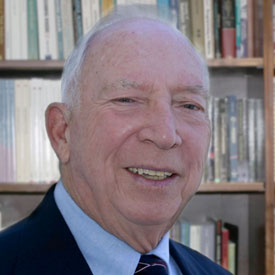In Memoriam: Joseph D. Novak
Senior Research Scientist Emeritus
Dr. Novak was a Senior Research Scientist at IHMC and Professor Emeritus, Cornell University, Department of Plant Science. Completing graduate studies at the University of Minnesota in 1957, he taught biology at Kansas State Teachers College at Emporia, 1957-59, and biology and teacher education courses at Purdue University, 1959-67. From 1967 to 1995, he was professor of education and biological sciences at Cornell University where his research focused on human learning, educational studies and knowledge creation and representation. His theory of education to guide research and instruction was first published in 1977 and updated in 1998 and 2010. He died in September 2023.
He was author or coauthor of 29 books and more than 140 book chapters and papers in professional books and journals. His Learning How to Learn (with Gowin) published in 1984 was translated into eight languages. He consulted with more than 400 schools, universities and corporations, including recent work with Procter and Gamble, NASA, the U.S. Navy, and EPRI. His 2010 book, Learning, Creating, and Using Knowledge: Concept Maps as Facilitative Tools in Schools and Corporations was translated into three languages. His final book, Helping People Learn, was published in 2022.
Dr. Novak is listed in Who’s Who in America, Who’s Who in Medicine and Health, and Who’s Who in Science and Engineering and Who’s Who in he World. He has received a number of awards and honors including a 1998 Honorary Doctorate from The University of Comahue, Nuquen, Argentina, Honorary Doctorate, Public University of Navarra, Pamplona, Spain, 2002, Honorary Doctorate from the University of Urbino in 2006, and the first award for contributions to science education from the Council of Scientific Society Presidents.
His research included studies on student’s ideas on learning and epistemology, and methods of applying educational ideas and tools (such as concept mapping) in corporate settings and distance learning programs. His work included the development of expert concept maps to scaffold learning and to explore ways to use concept maps together with brain imaging strategies to help discern brain functioning.
Publications
Books
Moon, B.M., Hoffman, R.R., Novak, J.D. & Cañas, J.J. (2011). Applied Concept mapping: Capturing, analyzing, and organizing knowledge. New York: CRC Press.
Novak, J.D. (2010). Learning, Creating, and Using Knowledge: Concept Mapas as Facilitative Tools in Schools and Corporations (2nd Ed.) NY: Routledge.
Cañas, A.J., Novak, J.D. & González, F.M. (Eds.), Concept Maps: Theory, Methodology, Technology, Proceedings of the First International Conference on Concept Mapping, Pamplona, Spain (September 14-17, 2004), Editorial Universidad Pública de Navarra.
González, F.M., Moron, C., & Novak, J.D. (2001). Errores Conceptuales: Diagnosis, Tratamiento y Reflexiones. Pamplona, Spain: Ediciones Eunate.
Mintzes, J., Wandersee, J. & Novak, J.D. (2000). Assessing Science Understanding. San Diego, CA: Academic Press
Novak, J.D. (1998). Learning, Creating , and Using Knowledge: Concept maps as facilitative tools for schools and corporations. Mahwah, N.J.,Lawrence Erlbaum & Assoc.
Novak, J.D. & Gowin, D.B. (1984). Learning How to Learn. Cambridge and NY: Cambridge University Press. Also published in Spanish, Italian, Portuguese, Finnish, Arabic, Thai, Japanese, and Chinese.
Mintzes, J., Wandersee, J. & Novak, J.D. (1998) Teaching Science for Understanding. San Diego, CA: Academic Press
González, F. M. & Novak., J.D. (1996). Aprendizaje Significativo Technicas Aplicaciones. Serie: Educacion y Futuro #18. Madrid: Ediciones Pedagogicas.
Papers
Novak, J.D. (2006). The Development of the Concept Mapping Tool and the Evolution of a New Model for Education: Implications for Mathematics Education. Focus on Learning Problems in Mathematics, 28:(3&4), 1-32.
Novak, J.D. (2006). Avancées en théorie et en technologie de l’apprentissage ainsi qu’en méthodologie del’enseignement. Conférence prononcée au 4e colloque du Cénacle dans le cadre du 40eCongrès de l’APSQ le 20 Octobre 2005 à Thetford Mines, P.Q.
Hoffman, R.R., Coffey, J.W., Ford, K.M. & Novak, J.D. (2006). A method for eliciting, preserving, and sharing the knowledge of forecasters. Weather and Forecasting, 21, 416–428.
Novak, J.D. & Cañas, A.J. (2006). Theoretical Origins of Concept Maps, How to Construct Them and Uses in Education. Reflecting Education, Vol. 3(1). (On-line Journal at:http://www.reflectingeducation.net/index.php/reflecting)
Novak, J.D. & Cañas, A.J. (2004). Building on New Constructivist Ideas and the CmapTools to Create New Model for Education. Closing Lecture. First International Conference on Concept Mapping: Theory, Methodology, Technology. Pamplona, Spain. Universidad Pública de Navarra.
Mintzes, J.J., Wandersee, J.H. & Novak, J.D. (2001). Assessing Understanding in Biology. J. of Biological Education, 35(3):119-124.
Novak, J.D. (2002). Meaningful learning: the essential factor for conceptual change in limited or appropriate propositional hierarchies (LIPHs) leading to empowerment of learners. Science Education, 86(4):548-571.
Novak, J.D. (2002). Using concept maps to facilitate classroom and distance learning. Scuola & Citta, 2:112-114.
Novak, J.D. (2003). The Promise of New Ideas and New Technology for Improving Teaching and Learning. Journal of Cell Biology Education, 2(Summer): 122-132. PDF at:http://www.cellbioed.org/articles/vol2no2/article.cfm?articleID=59
Novak, J.D. (2004). Reflections on a Half Century of Thinking in Science Education and Research: Implications from a Twelve-year Longitudinal Study of Children’s Learning. Canadian Journal of Science, Mathematics, and Technology Education, 4(1): 23-41.
Novak, J.D. (2005). Results and implications of a 12-year longitudinal study of science concept learning. Research In Science Education. 35(1): 23-40.


